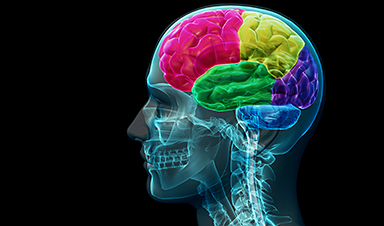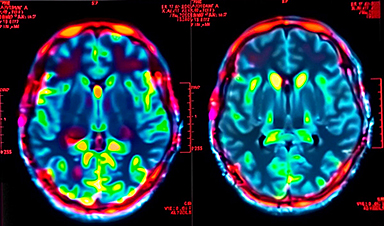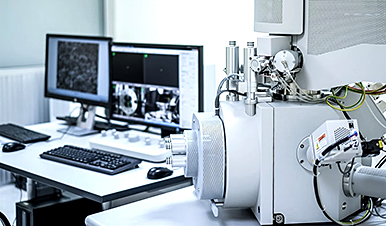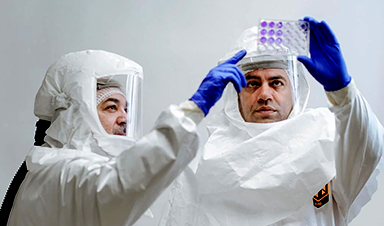Researchers have created nanoscale robots which could be used to manage bleeds in the brain caused by aneurysms. The development could enable precise, relatively low-risk treatment of brain aneurysms, which cause around 500,000 deaths globally each year. The medical condition—a blood-filled bulge on a brain artery that can rupture and cause fatal bleeds—can also lead to stroke and disability.
The study points to a future where tiny robots could be remotely controlled to carry out complex tasks inside the human body—such as targeted drug delivery and organ repair—in a minimally invasive way, researchers say.
Swarming bots
The team, involving researchers from the University of Edinburgh, engineered magnetic nanorobots—about a twentieth the size of a human red blood cell—comprising blood-clotting drugs encased in a protective coating, designed to melt at precise temperatures. The work is published in the journal Small.
In lab tests, several hundred billion such bots were injected into an artery and then remotely guided as a swarm, using magnets and medical imaging, to the site of an aneurysm.
Magnetic sources outside the body then cause the robots to cluster together inside the aneurysm and be heated to their melting point, releasing a naturally occurring blood-clotting protein, which blocks the aneurysm to prevent or stem bleeding into the brain.
Lab trials
The international team, co-led by clinicians from Shanghai Sixth People’s Hospital affiliated to Shanghai Jiao Tong University School of Medicine in China, successfully tested their devices in model aneurysms in the lab and in a small number of rabbits.
The team says that nanorobots show potential for transporting and releasing drug molecules to precise locations in the body without risk of leaking into the bloodstream—a key test of the technology’s safety and efficacy.
The study could pave the way for further developments towards trials in people.
Promising potential
Their advancement could improve on current treatments for brain aneurysms. Typically, doctors thread a tiny microcatheter tube along blood vessels before using it to insert metal coils to stem the aneurysm blood flow, or a mesh tube called a stent, to divert the bloodstream in the artery.
Researchers say their new technique could decrease the risk that the body will reject implanted materials, and curb reliance on anti-blood-clotting drugs, which can cause bleeding and stomach problems.
The method also avoids the need for doctors to manually shape a microcatheter to navigate a complex network of small blood vessels in the brain to reach the aneurysm—a painstaking task which may take hours during surgery, researchers say.
Larger brain aneurysms—which can be difficult to stem quickly and safely using metal coils or stents—could potentially be treated using the new technique too.
The study was led by a team from the UK and China who have also developed nanorobots to remove blood clots, which show potential in treating stroke.
“Nanorobots are set to open new frontiers in medicine—potentially allowing us to carry out surgical repairs with fewer risks than conventional treatments and target drugs with pinpoint accuracy in hard-to-reach parts of the body. Our study is an important step towards bringing these technologies closer to treating critical medical conditions in a clinical setting,” Dr. Qi Zhou.
More information: Jienan Wang et al, Nanoarchitectonic Engineering of Thermal‐Responsive Magnetic Nanorobot Collectives for Intracranial Aneurysm Therapy, Small (2024). DOI: 10.1002/smll.202400408
Journal information: Small
Provided by University of Edinburgh
News
Does COVID increase the risk of Alzheimer’s disease?
Scientists discover that even mild COVID-19 can alter brain proteins linked to Alzheimer’s disease, potentially increasing dementia risk—raising urgent public health concerns. A recent study published in the journal Nature Medicine investigated whether both mild and [...]
New MRI Study Reveals How Cannabis Alters Brain Activity and Weakens Memory
A massive new study sheds light on how cannabis affects the brain, particularly during cognitive tasks. Researchers analyzed over 1,000 young adults and found that both heavy lifetime use and recent cannabis consumption significantly reduced brain [...]
How to Assess Nanotoxicity: Key Methods and Protocols
With their high surface area and enhanced physicochemical properties, nanomaterials play a critical role in drug delivery, consumer products, and environmental technologies. However, their nanoscale dimensions enable interactions with cellular components in complex and [...]
Nanotech drug delivery shows lasting benefits, reducing need for repeat surgeries
A nanotechnology-based drug delivery system developed at UVA Health to save patients from repeated surgeries has proved to have unexpectedly long-lasting benefits in lab tests – a promising sign for its potential to help human patients. [...]
Scientists Just Found DNA’s Building Blocks in Asteroid Bennu – Could This Explain Life’s Origins?
Japanese scientists detected all five nucleobases — building blocks of DNA and RNA — in samples returned from asteroid Bennu by NASA’s OSIRIS-REx mission. NASA’s OSIRIS-REx mission brought back 121.6 grams of asteroid Bennu, unveiling nitrogen-rich organic matter, including DNA’s essential [...]
AI-Designed Proteins – Unlike Any Found in Nature – Revolutionize Snakebite Treatment
Scientists have pioneered a groundbreaking method to combat snake venom using newly designed proteins, offering hope for more effective, accessible, and affordable antivenom solutions. By utilizing advanced computational techniques and deep learning, this innovative [...]
New nanosystem offers hope for improved diagnosis and treatment of tongue cancer
A pioneering study has unveiled the Au-HN-1 nanosystem, a cutting-edge approach that promises to transform the diagnosis and treatment of tongue squamous cell carcinoma (TSCC). By harnessing gold nanoparticles coupled with the HN-1 peptide, [...]
Global Trust in Science Is Stronger Than Expected – What’s Next?
A landmark global survey conducted across 68 countries has found that public trust in scientists remains robust, with significant support for their active involvement in societal and political matters. The study highlights the public’s [...]
Microplastics in the bloodstream may pose hidden risks to brain health
In a recent study published in the journal Science Advances, researchers investigated the impact of microplastics on blood flow and neurobehavioral functions in mice. Using advanced imaging techniques, they observed that microplastics obstruct cerebral blood [...]
AI Surveillance: New Study Exposes Hidden Risks to Your Privacy
A new mathematical model enhances the evaluation of AI identification risks, offering a scalable solution to balance technological benefits with privacy protection. AI tools are increasingly used to track and monitor people both online [...]
Permafrost Thaw: Unleashing Ancient Pathogens and Greenhouse Gases
Permafrost is a fascinating yet alarming natural phenomenon. It refers to ground that remains frozen for at least two consecutive years. Mostly found in polar regions like Siberia, Alaska, and Canada, permafrost plays a [...]
Frequent social media use tied to higher levels of irritability
A survey led by researchers from the Center for Quantitative Health at Massachusetts General Hospital and Harvard Medical School has analyzed the association between self-reported social media use and irritability among US adults. Frequent [...]
Australian oysters’ blood could hold key to fighting drug-resistant superbugs
Protein found in Sydney rock oysters’ haemolymph can kill bacteria and boost some antibiotics’ effectiveness, scientists discover An antimicrobial protein found in the blood of an Australian oyster could help in the fight against [...]
First U.S. H5N1 Death Sparks Urgency: Scientists Warn Bird Flu Is Mutating Faster Than Expected
A human strain of H5N1 bird flu isolated in Texas shows mutations enabling better replication in human cells and causing more severe disease in mice compared to a bovine strain. While the virus isn’t [...]
AI Breakthrough in Nanotechnology Shatters Limits of Precision
At TU Graz, a pioneering research group is leveraging artificial intelligence to drastically enhance the way nanostructures are constructed. They aim to develop a self-learning AI system that can autonomously position molecules with unprecedented precision, potentially [...]
How Missing Sleep Lets Bad Memories Haunt Your Mind
Research reveals that a lack of sleep can hinder the brain’s ability to suppress unwanted memories and intrusive thoughts, emphasizing the importance of restful sleep for mental health. Sleep deprivation has been found to [...]






















